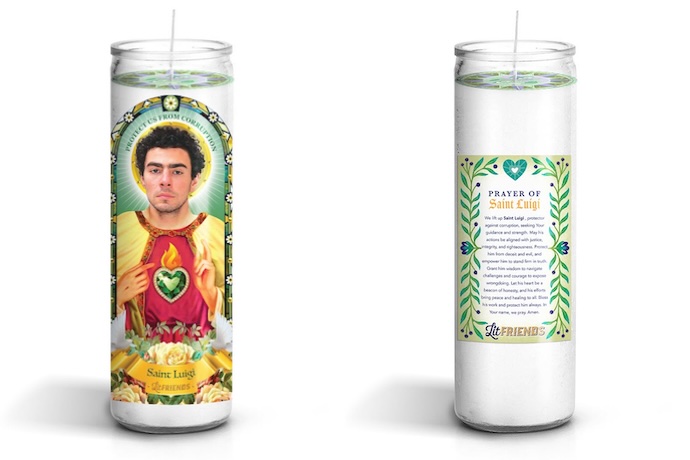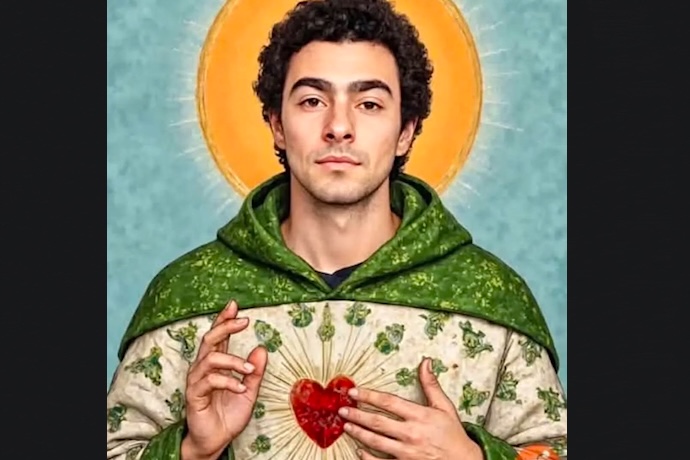When Luigi Mangione was arrested for the murder of UnitedHealthcare CEO Brian Thompson he had in his possession a handwritten document in which he described healthcare corporations as “mafiosa [that] have gotten too powerful,” and declared that he was “the first to face it with such brutal honesty.” His image has since proliferated on saint candles, prayer cards, posters, while frequent RD contributor Ed Simon notes in “The Canonization of St. Luigi” that “authorities inadvertently transformed a perp walk photo of Mangione into a Renaissance painting of the arrest of Christ.”
At first, images of Mangione as a saint appear alongside sardonic comments celebrating, or at least refusing to mourn, Thompson’s death. Many have treated his demise as the natural consequence of the growing outrage with health insurance corporations in the US. But dig a bit deeper and you’ll find that people are actually venerating Mangione, incorporating the still-very-much-alive vigilante into their pantheon of folk saints.
On December 11th Alison McCrary, a self-described “political, cultural & spiritual worker,” posted an image on Instagram of “Saint Luigi, Patron Saint of Healthcare Access for All.” [See main story image above.]
The image of Mangione, wearing a green mantle with a red sacred heart emblazoned on his chest, was circulated widely. Around his head is a gold halo, his right hand raised in a sign of benediction. Bronx-based photographer Edwin Pagán shared it with the caption “Saint Luigi the Adjuster,” while another Instagram user (whose account has since been made private) captioned it “Saint Luigi of Altuna Patron Saint of Health Care Justice!” Posters of the image under the words “FREE LUIGI” have also been spotted.
Within 24 hours Lit Friends was selling a saint candle with Mangione’s mugshot.

Under the words “Protect us from corruption” Luigi now wears a red mantle with a green jewel heart on fire, one of his hands pierced by stigmata. On the back is the “Prayer of Saint Luigi”:
We lift up Saint Luigi, protector against corruption, seeking Your guidance and strength. May his actions be aligned with justice, integrity, and righteousness. Protect him from deceit and evil, and empower him to stand firm in truth. Grant him wisdom to navigate challenges and courage to expose wrongdoing. Let his heart be a beacon of honesty, and his efforts bring peace and healing to all. Bless his work and protect him always. In Your name, we pray. Amen.
People are buying and Lit Friends is not the only outlet. Instagram user “Phoenix” posted yet another version of the Saint Luigi candle with the words “Patron saint of the peoples” written across his gold cloak. In the comments, user “Saint Luigi” directs eager buyers to still another version, this one reading “Protect us from corruption.”
Lit Friends’ and Phoenix’s Saint Luigi posts alone have close to 20 thousand likes, but commenters’ reactions to the sanctification of Mangione vary. While the minority are appalled by the killing of a human being, the majority are enthusiastic, either looking to purchase a candle or sharing their own insurance company horror stories. Like the candles, they describe Mangione’s action as the spark for a class reckoning in the United States.

Posted by ‘Phoenix’ on Instagram, this candle reads ‘Patron saint of the peoples.’
After one user commented on Lit Candle’s post: “I’m finna perform the black sacrament ‘sweet Luigi, sweet Luigi, send your child unto me,’” another replied, finishing the phrase: “for the sins of the unworthy must be baptized in blood and fear.” A repost of Lit Friends’ Saint Luigi candle (now private) was captioned: “revolutions are rarely if ever peaceful. The powerful are taking advantage of the weak.”
Mangione isn’t the only saint “beatified” for “justifiable” murder but he is one of the first young, living figures being treated as a saint (or, more accurately, “folk” saint). Jesus Malverde, known as the Angel of the Poor and the Narco Saint, has been venerated by drug traffickers since his death. In a Saint Luigi post captioned “Overnight Folk Saint” (flanked by praying hands) Michael Therese McQueen (@saintlytarotmystic) observes that, like Malverde (whom he likens to Robin Hood), Mangione is part of a collection of “morally grey” folk saints who don’t follow the rules.
For some, these candles and prayer cards serve as a message to other CEOs and “haves”—a nonsectarian (though not entirely secular) revolutionary action of displaying a holy murderer—but for others this has blurred into actual veneration.
It’s arguably part of a wider trend toward venerating celebrities themselves as folk saints. It may seem derogatory or appropriative to some, but most saint candle creators will tell you that it goes much deeper—bucking the very religious institutions that harmed or abandoned them. A friend of mine who is both a drag queen and an ordained minister has a saint candle of radical gay activist (and devout Catholic) Marsha P. Johnson, as well as one of Dorothy Day—two revolutionaries not canonized within the Catholic Church but who nevertheless represent community elders fighting for change despite major pushback.
Kerrin Piche Serna, owner of The Eternal Flame candle shop and “devout worshipper of Mother Oprah, Saint Gayle and the entire canon of Bravo saints,” explains on her website (tagline: “False Idols for True Worship”) that “I actually do worship these people and admire what they stand for. Fan art is, at its heart, deep appreciation, nostalgia and love.” Arguably, prayer cards and candles depicting a “Saint Luigi”—glorifying a person made celebrity through murder—are simply a darker actualization of this phenomenon.
Photos and videos including the saint candles and prayer cards are sometimes followed by fundraising campaigns for Mangione’s legal defense. The Luminary and Co., for example, donated $5 out of every sale of a Saint Luigi devotional candle into Luigi’s commissary fund in jail until a defense fund was started. The company offers two different types of candles—the traditional saint image and one of Luigi in front of a monopoly board—indicative of the conversations his actions have sparked about capitalism and healthcare.
And for better or worse, Mangione’s supporters and new devotees claim that Mangione’s actions have precipitated real change. Indeed, it doesn’t appear to be a coincidence that just two days after the murder Anthem Blue Cross Blue Shield halted its plan to refuse coverage for any anesthesia administered over a pre-allocated time for the surgery.
It’s an interesting religious phenomenon developing before our very eyes. In some critical ways it isn’t all that different from the stories of more traditional saints and biblical figures, many of whom fought and killed for what they saw as God’s will. Luigi did much the same—at least that’s how his actions are being interpreted by some. As McQueen observed, “we can make lots of examples of biblical figures we hail as [heroes] who are in similar positions [to Luigi Mangione].”


